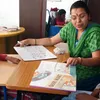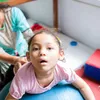How Prachi Deo created a new path for 3,500 caregivers of children with special needs
Nayi Disha, a platform started by Prachi Deo, provides information, resources, and support to families and caregivers of children with intellectual and developmental disabilities.

Prachi Deo, Founder of Nayi Disha
An old Maori proverb goes: “Turn your face to the sun and the shadows fall behind you.” The stories of caregivers of children with special needs exemplify this, showcasing unconditional love, faith, and belief. Every day brings a new challenge, but they see their children beyond their disability – for what they are – their children.
And while they devote themselves completely to their children, not much is available for these caregivers in terms of information, research, or support. That’s where Nayi Disha comes in. Founded by Prachi Deo in Hyderabad in 2015, this platform provides essential information to families of children with intellectual and developmental disabilities, helps them find services, and also connects them with other families. These online and offline engagements help caregivers with information at different stages of the lives of their loved ones.
“Most caregivers don’t have the support and information is not easily available. That became the genesis of Nayi Disha,” Prachi tells HerStory.
“While there are organisations that work with special children, providing them with intervention, schooling, and vocational training, there is very little support available to parents and caregivers. The journey starts with the parents and their intensity of interaction is the most; they are the ones most invested in the child’s development. So I thought why not work with families?” she adds. Prior to starting Nayi Disha, Prachi worked as a technology professional with Microsoft and TCS.
Prachi knows what the lack of information and support means to families first hand. She has an older brother with Down syndrome, and there was little to no information or support available while he was growing up, she says.
Right information at the right time
According to a 2004 World Health Organization report, there are 31 million people with intellectual and developmental disabilities in India. This prompted Nayi Disha to conduct a landscape study before it began operations.
“With the study, we found out that there are very few parents who actually know about their child’s condition in the beginning. The constant narrative is ‘I didn’t know about Down syndrome or autism till the doctor informed me’. Also, getting the right information at the right time is very critical,” she shares.
Prachi explains that the first year after diagnosis is always a daze; parents go through a cycle of denial, and then acceptance. They are in a fix as they don’t know whom to approach. But, she believes, there is no doubt that it is the family who stands strong and supports the child. And they need all the help they can get.
With you – online and offline
1562052974168.png?fm=png&auto=format)
The Nayi Disha team
The aim of Nayi Disha is to provide information, guidance, and support, both online and offline to families of children with special needs. It does so, in three different ways.
All they have to do is log into the website, which provides latest research and evidence-based information, in collaboration with subject-matter experts in the field. This is available by way of audio, video, infographics, etc.
The website also provides a directory of available services in various cities with user reviews and ratings.
Prachi elaborates, “If we list an occupational therapist, we also gives details about her degree, experience, etc so that parents can make informed decisions. As needs are varied, so are the services. Parents can get information from details of a music teacher, a neurologist, or a residential care service. They can also rate and review providers, so that the information is further verified.”
The third service provided by Nayi Disha is the service support group. It has nine online support groups and a few offline initiatives started by mothers to support each other in Hyderabad, Pune, Bengaluru, and Mumbai. Here, mothers can have some “me-time” with yoga classes, art, or simply discussions on parenting.
The elephant in the room
Founded in 2015, Nayi Disha is now associated with over 3,500 families across the country. It started as a bootstrapped platform by its founders and co-founders and is looking for partners to scale its initiative. The team comprises content developers, designers, volunteers, freelancers and some full-time staff based in Hyderabad.
Caregivers continue to face challenges, of different kinds. “What after me?” is the biggest elephant in the room, and the first thing parents wonder when their child is diagnosed with a disability. “So, we often have queries for residential services that can take care of them later in life. Also, finding inclusive schools is a big challenge.”
“However, it’s amazing when you get a call from a mother who says she didn’t know her daughter could avail of speech therapy until she attended the first workshop, or how hospitals in Hyderabad refer newly-diagnosed parents to the website. Then, all of it is definitely worth it,” Prachi adds.
It takes a village to raise a child
In the near future, Nayi Disha is looking at making information available in different Indian languages, and also launching a mobile app.
What more can be done? “We cannot work in silos,” says Prachi, adding, “they say it takes a village to raise a child, and this is true of children with special needs too.”
She emphasises the importance of inclusion, and early intervention along with resources for parents to help the child at the right time. The government too has to play a role beyond what it is doing right now.
“We need empathy, and that will happen only when people are aware. We need to sensitise people to understand what struggling with disabilities really means for the child and the family. This is very important,” Prachi adds.









